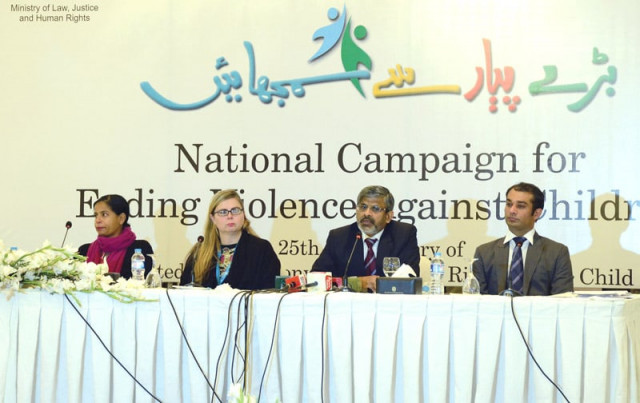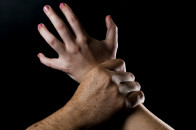Bare Pyar se Samjahien: Drive to end corporal punishment launched
The Unicef-law ministry initiative aims at creating awareness about child protection .

The launching ceremony of the drive, ‘‘Bare Pyar se Samjahien’, a joint initiative of the Ministry of Law and the United Nations Children’s Fund (UNICEF),was held at a local hotel to mark the Universal Children’s Day.
The three-month campaign aims at reaching out to millions of people across the country through various mediums, incorporating messages on adverse effects of corporal punishment.

The programme was part of the celebration of 25 years of the UN Convention on the Rights of the Child. Pakistan is also one of the signatories but lags far behind in fulfilling its obligations.
Talking to The Express Tribune, an official of the law ministry on condition of anonymity revealed that though during the past 25 years a few child protection laws have been made but have not been as effective in controlling violence against children.
“Pakistan lacks the budget allocation for the implementation of many laws effectively,” he said.
“Even in the capital city, we get to see children begging on all major roads or washing cars, working in workshops where they are mistreated by their owners,” the official added.
On the other hand majority of the law enforcement agencies’ personnel are not aware of the laws and do not pay much attention to the children’s miseries, he said. Moreover, children who become victims of corporal punishment are not even aware of these laws due to which they are subjected to torture, which also inflicts mental agony upon them, he said.
He was of the view that corporal punishment is one of the major reasons behind the increase in school dropout rates.
Chief Child Protection for Unicef, Sarah Coleman, told The Express Tribune that though Pakistan is making efforts to address the issue, it is facing grave challenges.
She said there are a number of issues interlinked with each other ultimately affecting the children including malnutrition, lack of access to health facilities, getting inoculated against nine preventable disease and access to education among others.
According to Unicef, out of 74 million children, below 18 years in Pakistan, 60 million children do not have evidence to prove their existence.
Around 6.5 million children do not go to elementary schools, 6.5 million primary school children are out of school and 12 million children work as child labourers.
On the other hand, 500,000 children die before reaching the age of five annually half of which die due to malnutrition or for not having being vaccinated for a preventable disease.
On the occasion, participants were informed that before the launch of this campaign a baseline survey was conducted in five districts. The study revealed that nine in 10 guardians such as parents and caregivers have beaten their children with more than half of them knowing that it could have long-term effects on the child.
Mashal school event
A similar event was organised at Mashal Model School in Bari Imam by Right to Play where children presented a puppet show and other skits highlighting importance of child protection.
Suzanne Heyward, wife of the Australian High Commissioner, was the chief guest.
Speaking on the occasion, Iqbal Jatoi, country manager of Right To Play Pakistan, said “ the day is not only a celebration of having an international treaty to endorse children rights but a reminder for all of us that children are our future and we need to do everything possible to ensure their well being”.
The organisation uses sports and play as a tool to promote development and peace in several schools across the country.
Published in The Express Tribune, November 21st, 2014.



















COMMENTS
Comments are moderated and generally will be posted if they are on-topic and not abusive.
For more information, please see our Comments FAQ